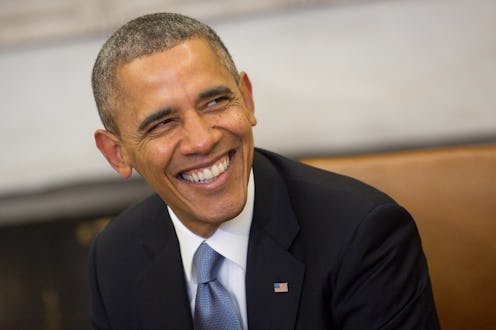News
He Says Marriage Equality's A Constitutional Right
It's been an exciting couple of weeks for marriage equality, hasn't it? Between the Supreme Court declining to hear a spate of appeals trying to derail same-sex marriage bans that have fallen at the state level, and specific rulings by the Ninth Circuit Court of Appeals — Arizona's ban dissolved on Friday — things are looking up in a big way. And now President Obama has offered his two cents, and it's slightly historic: Obama said same-sex marriage is a constitutional right, under the Equal Protection Clause of the 14th Amendment, something of a milestone for broad acceptance of same-sex relationships.
While it comes as little surprise at this point that Obama feels this way, having been openly supportive of same-sex unions already, it's nonetheless significant to have a sitting President (and former constitutional law professor, to boot) making such a forthright and matter-of-fact comment about the U.S. constitution providing for LGBT citizens' rights. It's a testament to just how far this issue has moved over the last ten years — lest you forget, it was in the run-up to his 2004 reelection bid that former President George W. Bush rallied support with a proposed amendment to the U.S. constitution, cementing marriage as exclusively heterosexual.
Nowadays, it's almost unthinkable that even a Republican president would roll the dice on such a proposition — national support for same-sex marriage is now a majority proposition, with 59 percent supporting such marriages in a Washington Post/ABC News poll back in May. And even beyond the question of whether same-sex couples should be allowed to marry, a full half of those people polled also stated they agree with President Obama's take on the matter — 50 percent said same-sex couples have a constitutional right to marry. In other words, this is not a particularly controversial take, however much some Republicans might want to make it seem that way.
President Obama made his remarks in an interview with Jeffrey Toobin in The New Yorker, published Monday.
In some ways, the decision that was just handed down to not do anything about what states are doing on same-sex marriage may end up being as consequential — from my perspective, a positive sense — as anything that’s been done. ... Ultimately, I think the Equal Protection Clause does guarantee same-sex marriage in all fifty states.
This is quite a turnaround in opinion, at least by what Obama's steadfastly claimed since emerging as a major player on the national stage nearly eight years ago. Up until 2012, he publicly opposed marriage equality, a position which many of his supporters viewed, correctly or incorrectly, as a lie of convenience. While there's no telling for sure what thinking went on behind the scenes for him, and whether his eventually embrace represented an "evolution," or just an at long-last admission, the proof of his support is in the results.
When Obama took office in Jan. 2009, there were only two U.S. states with full same-sex marriage rights — Massachusetts and Connecticut.
Now, just six years or so later, a majority of the states allow same-sex marriages — 31 in all, from liberal bastions like California to red-state environs like Alaska and Kentucky. And while it's being achieved through a sort of patchwork approach, rather than an overarching federal mandate as Obama believes the constitution warrants, it's getting done all the same, and he's happy about it.
There have been times where the stars were aligned and the Court, like a thunderbolt, issues a ruling like Brown v. Board of Education, but that’s pretty rare. And, given the direction of society, for the Court to have allowed the process to play out the way it has may make the shift less controversial and more lasting.
For some perspective, here's what the 14th Amendment's Equal Protection Clause actually says, at the conclusion of Section 1.
All persons born or naturalized in the United States, and subject to the jurisdiction thereof, are citizens of the United States and of the State wherein they reside. No State shall make or enforce any law which shall abridge the privileges or immunities of citizens of the United States; nor shall any State deprive any person of life, liberty, or property, without due process of law; nor deny to any person within its jurisdiction the equal protection of the laws.
Sounds about right, huh? It goes without saying, given his status as the first U.S. president to openly support marriage equality, that President Obama is also the first to claim its constitutional protection. And, seeing the case laid out there in (relatively) plain English, it's hard to argue with him.
Images: Getty Images (3)
